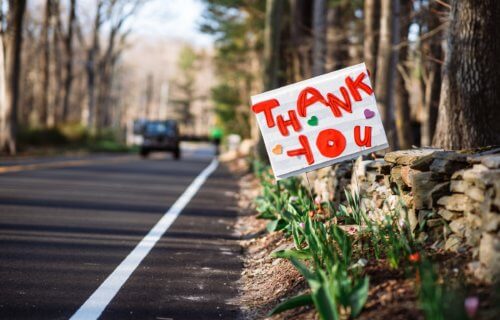PROVO, Utah — The COVID-19 pandemic shone some much needed light on the importance of essential workers, from grocery store clerks and nurses to first responders and sanitation workers. Long overdue, the pandemic sparked a flurry of posts on social media thanking essential workers for their contributions to keeping society going during the hardest weeks and months of the health crisis. Now, new research reveals these messages made a major difference for certain essential workers.
Importantly, though, the study also found other essential workers not receiving the same support often ended up dealing with more negative emotions. Researchers note they were more likely to drink, smoke, or overeat in an unhealthy attempt to “recover” from work burnout. On the other hand, essential workers who saw lots of praise or appreciation tended to recover in more healthy ways from on-the-job stress and report feeling more energized in general.
“There are a lot of people that work behind the scenes, and we don’t see them, but they do need our public gratitude,” says study author Taeya Howell, an assistant professor in BYU’s Marriott School of Business, in a university release. “One of the main drivers behind doing the project was to understand what public gratitude does for essential workers while also calling attention to essential workers who are less visible.”
Who still needs praise?
The research found that many essential workers operating in less visible fields (corrections officers, sanitation workers, truck drivers) felt like the public had totally forgotten about their contributions and failed to express any gratitude toward them at all.
These findings are based on two main experiments. The first was a survey of 186 corrections officers in New England during May and June 2020. The second was another survey featuring 376 other essential workers (nurses, grocery store workers, doctors) who had seen social media posts praising their own work or the work of other essential workers.
Study authors point to two conflicting quotes from members of each group to illustrate the wellness disparity between workers seeing praise online.
“We’re doing three times the amount of work and feel more unappreciated than before this virus,” one corrections officer explains. “Sometimes I question why I’m still an officer.”
“From the patients, from the families, from management, from random people on the street… They stopped to say ‘Thank you,’ and it just re-energizes you,” says one nurse during a recent media report.
A little thank you goes a long way
An earlier pilot study put together by the same scientists even found a meager three percent of respondents consider corrections officers essential workers during the pandemic.
“This job is thankless… we believe that people feel that our lives are not as valuable as other first responders,” adds another corrections officer who took part in this project.
Meanwhile, more visible essential workers who felt appreciated were much more likely to engage in healthier activities like working out, meditating, and spending time around nature.
“The general public needs to be more cognizant of the fact that showing gratitude to only some essential workers (but not others) can have detrimental effects on those who don’t receive gratitude,” adds study co-author Hee Young Kim, associate professor of management at Rider University.
Study authors conclude by encouraging readers to remember that expressing gratitude is free and only takes a few moments. Within just a few seconds, you can potentially brighten someone else’s day significantly.
“From an organizational perspective, this is a pretty powerful insight because companies spend a lot of money on other programs or initiatives that are intended to improve well-being of these workers, and yet may not be positively impacting these workers in the same way that felt gratitude does,” notes Sarah Doyle, assistant professor of management and organizations at the University of Arizona’s Eller College of Management.
The study is published in the journal Social Psychological and Personality Science.

